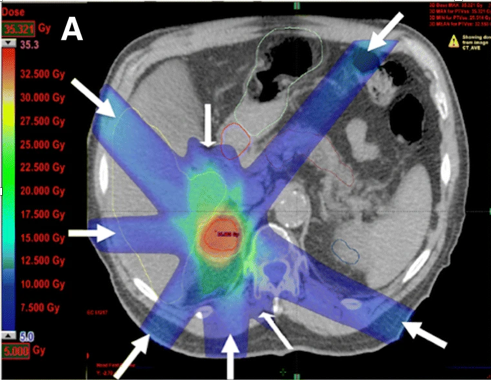Renal cell carcinoma (Kidney cancer)
The global burden of kidney cancer is expected to rise. Although surgery remains the mainstay of treatment, stereotactic body radiotherapy (SBRT) is an emerging option for the treatment of kidney cancer, especially for patients who are not fit for surgery. This short article describes this new treatment, which is available in Singapore.

In the past, radiotherapy was rarely used for kidney cancer, except for palliation (symptom relief) as it has traditionally been considered resistant to radiotherapy.

Stereotactic body radiotherapy (SBRT) / Steretactic ablative radiotherapy (SABR) for kidney cancer

Recently, advances in technology have allowed us to deliver radiotherapy with more precision; this allows us to deliver higher doses in fewer fractions that can effectively overcome resistance to radiotherapy. Although surgery is still the main treatment modality, stereotactic body radiotherapy (SBRT) is emerging treatment option for patients who are not suitable for surgery due to factors such as age, or medical comorbidities.
Outcomes with SBRT/SABR
At a recent conference (ASTRO 2023), Dr Shank Siva and colleagues demonstrated excellent results with SBRT/SABR for kidney cancer. With a median follow-up period of 43 months, the local control rate (control at the tumour site) was 100%. The freedom from distant failure was 100%, meaning no patient developed metastases while on observation. The cancer specific survival was 100%, meaning no patient died from cancer. The average kidney function loss was 14.6 mLs/min, which is comparable to surgery with a partial nephrectomy (part of kidney removed).
Side effects
Serious side effects can include a reduction in kidney function and damage to surrounding organs such as bowel (intestines). Fortunately, serious side effects are not common if precautions are taken. Your radiation oncologist and team will need to optimize delivery of radiotherapy to ensure that the risk of serious side effecs can be minimized. Less serious side effects include skin redness and pain.
If you are interested in finding out more, please contact a radiation oncologist.
Authors
Dr Looi Wen Shen
Email: wenshen.looi@proton.sg
WhatsApp +65 92975542
Dr Wong Ru Xin
Email: ruxin.wong@proton.sg
Dr Shaun Ho
Email: shaun.ho@proton.sg
